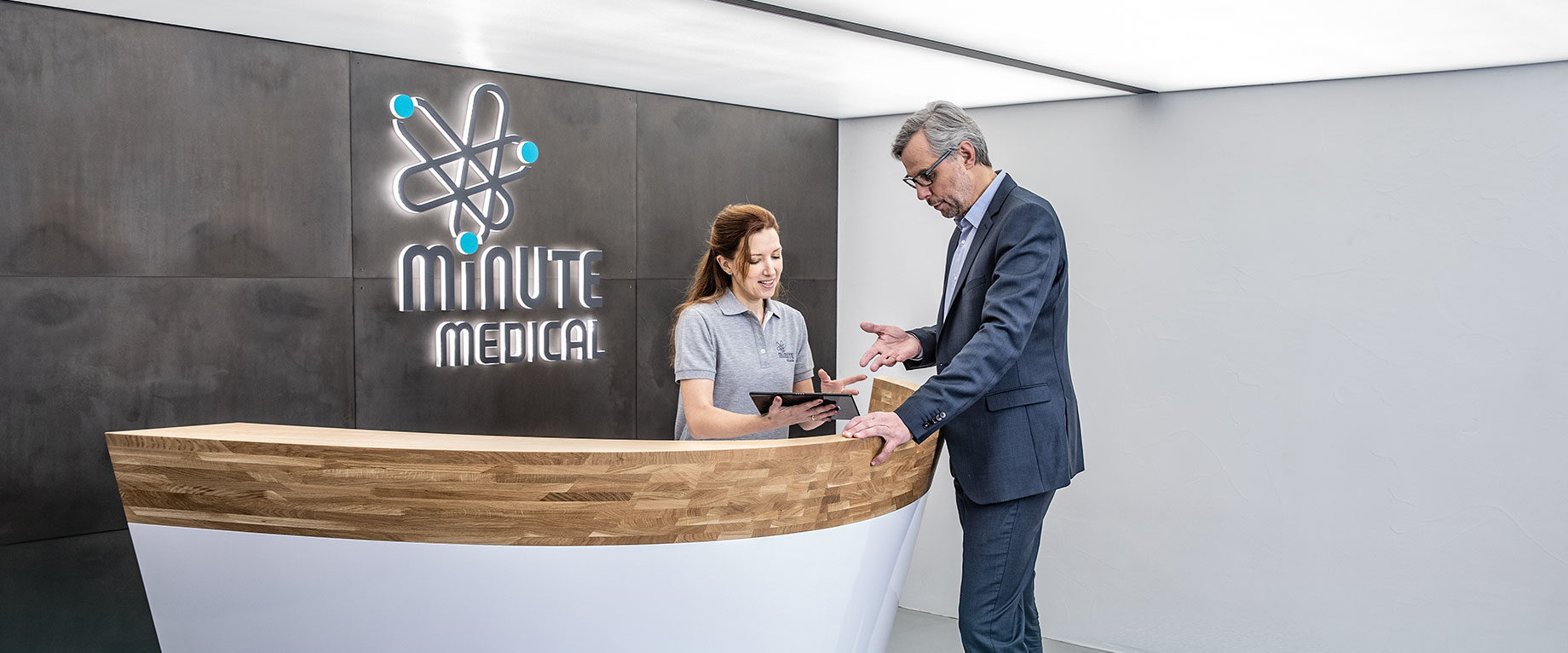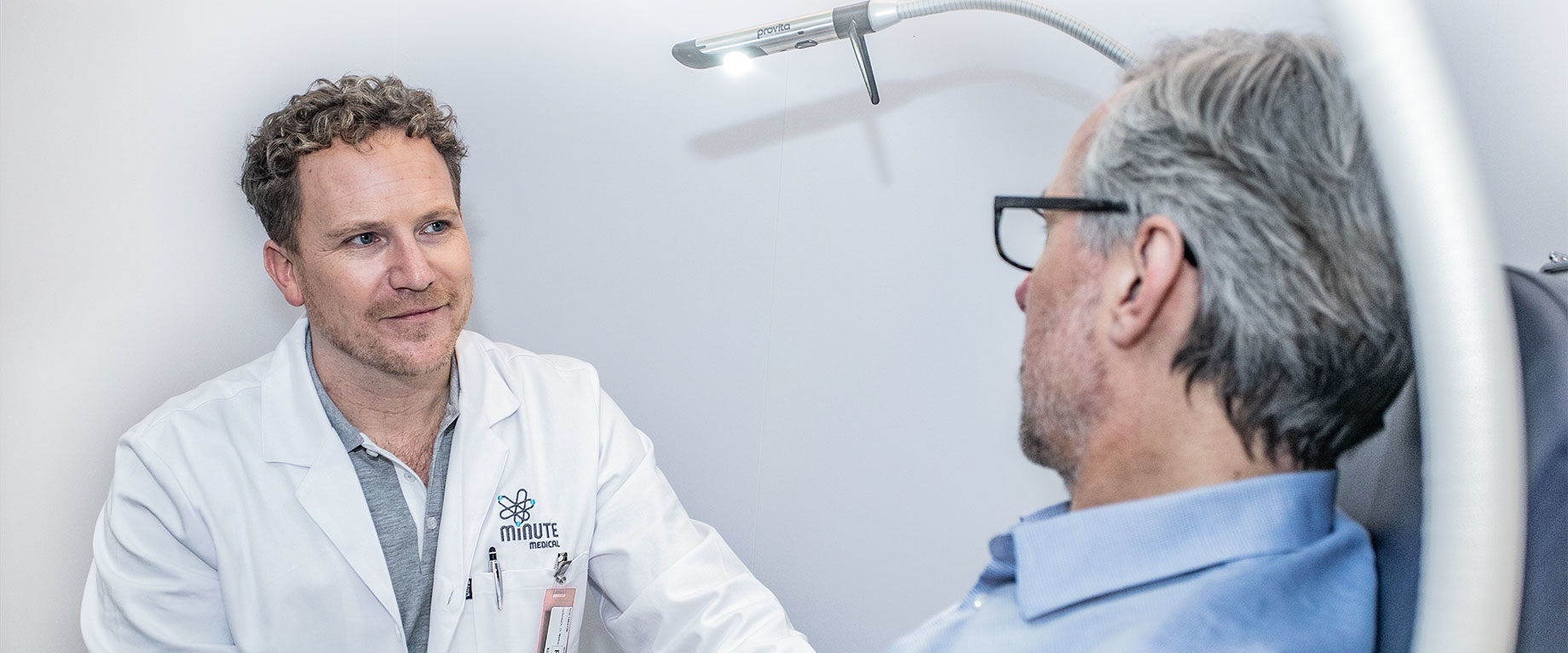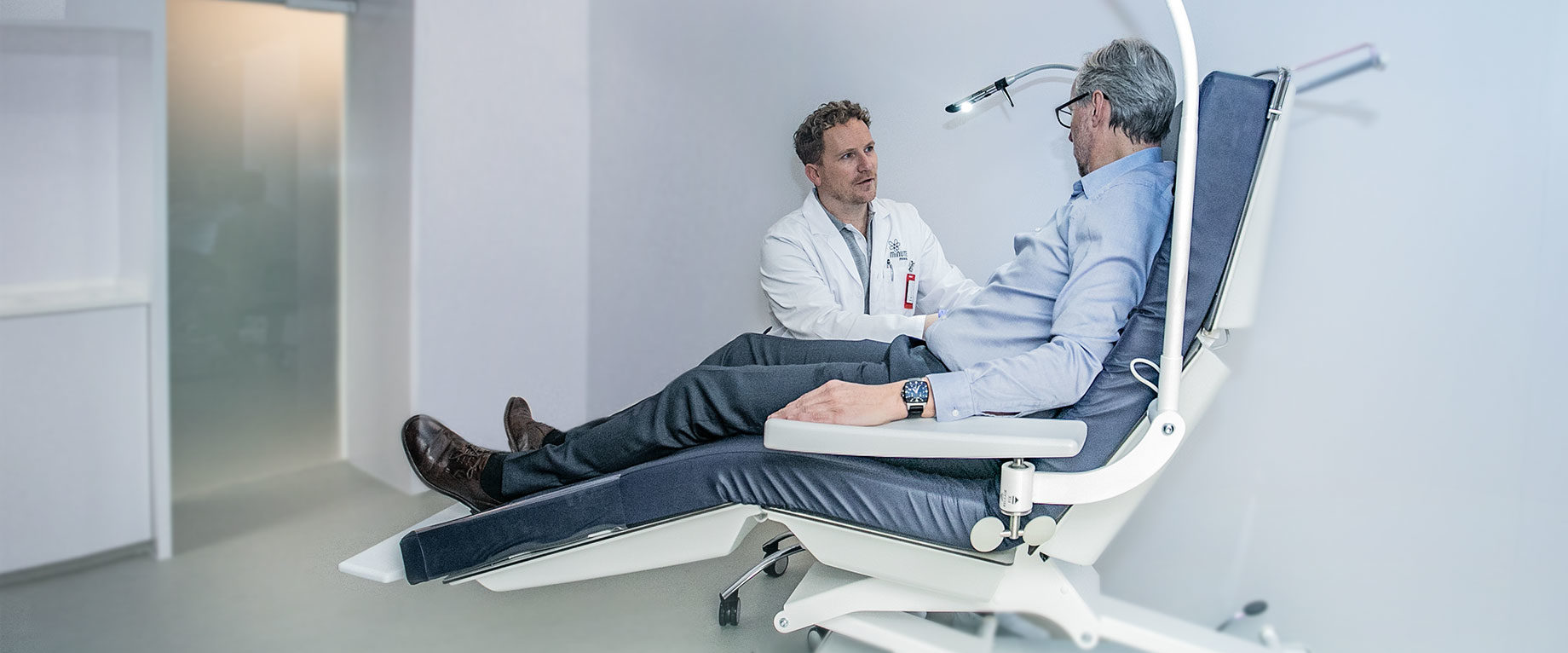Frequently Asked Questions
General
 Procedure
Procedure After the therapy session
After the therapy session Am I radioactive, should I stay away from my family members?
Am I radioactive, should I stay away from my family members? Can I continue to take my medication, is it compatible with the radioligand therapy?
Can I continue to take my medication, is it compatible with the radioligand therapy? What should I abstain from doing after the session?
What should I abstain from doing after the session? What should I eat/drink to minimize the damage?
What should I eat/drink to minimize the damage? Is it safe to receive the radioligand therapy in an outpatient setting? Don’t I need to stay in a hospital under constant medical supervision?
Is it safe to receive the radioligand therapy in an outpatient setting? Don’t I need to stay in a hospital under constant medical supervision?

Procedure
The radioligand treatment itself takes about 15-20 minutes. The labeled radioligands are injected intravenously. For supportive purposes, to lessen the strain on the kidneys, you should drink plenty of fluids before and after the treatment. After the therapy, you can leave the clinic any time. You will be given detailed information in advance as to the practices specific to radiation.
After the therapy session
To accelerate the excretion of radioactive substances from the body, it is recommended to drink plenty of fluids (about 2.5-3 liters), and to avoid excessive physical exercise, wherever possible. You may feel slight fatigue in the first 2-3 days. As a precaution, avoid contact with pregnant women and small children for the next 3 days. However, you do not pose any danger to people living in the same household.


After the therapy session
To accelerate the excretion of radioactive substances from the body, it is recommended to drink plenty of fluids (about 2.5-3 liters), and to avoid excessive physical exercise, wherever possible. You may feel slight fatigue in the first 2-3 days. As a precaution, avoid contact with pregnant women and small children for the next 3 days. However, you do not pose any danger to people living in the same household.

Am I radioactive, should I stay away from my family members?
Of course, you emit a certain amount of radiation after the therapy, but in general it does not exceed the legal limits and doesn’t affect your relatives. After each session, we carry out a standardized measurement on you so that these limit values are complied with in any case. Nevertheless, contact with pregnant women and small children should be avoided for at least 3 days, as these population groups are deemed particularly sensitive. However, you excrete the majority of the therapeutic via kidneys within the first 12 hours after the session, so that only little radiation emanates from you.
Can I continue to take my medication, is it compatible with the radioligand therapy?
There are generally no restrictions here. Regarding medications you take specifically for cancer (for example, antihormonal therapy), we will coordinate the treatment plan with you and your urologist/oncologist.


Can I continue to take my medication, is it compatible with the radioligand therapy?
There are generally no restrictions here. Regarding medications you take specifically for cancer (for example, antihormonal therapy), we will coordinate the treatment plan with you and your urologist/oncologist.

What should I abstain from doing after the session?
In principle, there are few restrictions except for the above-mentioned radiation-specific practices. You should avoid excessive physical exercise or similar strain for about 1 week after the therapy.
What should I eat/drink to minimize the damage?
It is necessary to drink plenty of water before and after the therapy (about 2.5-3 liters a day). Any other specific dietary recommendations have not yet been evaluated in connection with the radioligand therapy. Therefore, there are currently no recommendations or restrictions in this regard.


What should I eat/drink to minimize the damage?
It is necessary to drink plenty of water before and after the therapy (about 2.5-3 liters a day). Any other specific dietary recommendations have not yet been evaluated in connection with the radioligand therapy. Therefore, there are currently no recommendations or restrictions in this regard.

Side effects
Both salivary glands and kidneys also contain the PSMA enzyme on their surface. However, so far no severe side effects on these organs have been observed in thousands of treatments.
To a low extent and mostly only after repeated treatment, the feeling of dry mouth (usually temporary) is the most frequently reported side effect.
In addition, like any radiation therapy, radioligand therapy can also lead to alteration in the blood count, mostly in patients with the pre-existing bone marrow damage and multiple bone metastases. It is mostly a reversible alteration and not perceptible to the patient. We, nevertheless, keep an eye on your blood count and other laboratory parameters during and after the therapy.
The findings of the VISION trial presented in March 2021 demonstrated that overall the 177Lu-PSMA-617 therapy is well tolerated. For further information please consult “Lutetium-177–PSMA-617 for Metastatic Castration-Resistant Prostate Cancer”.
Read more on the 177Lu-PSMA therapy.
How significant is the damage to other organs?
Due to the high-precision accumulation of the drug on the tumor cells, the protection of the surrounding tissues is maximally guaranteed. However, the kidneys (next to the excretion of the drug) as well as the salivary glands also possess the so-called PSMA. However, in the last 8 years, no significant damage to these organs has been detected in thousands of therapies, including in controlled, prospective studies.


How significant is the damage to other organs?
Due to the high-precision accumulation of the drug on the tumor cells, the protection of the surrounding tissues is maximally guaranteed. However, the kidneys (next to the excretion of the drug) as well as the salivary glands also possess the so-called PSMA. However, in the last 8 years, no significant damage to these organs has been detected in thousands of therapies, including in controlled, prospective studies.

Is it possible to know in advance whether the therapy will be effective for me?
In general, even in patients who have already undergone all conventional treatments, the response rate of the therapy is still >80%. With the help of the mandatory 68Gallium PSMA PET/CT, we can determine beforehand whether your tumor and any metastases have a sufficiently high PSMA expression (density). However, even with these averaged response rates, the individual response cannot be predicted with absolute certainty.
What demonstrates that the therapy has worked and when does it become clear?
We are currently applying a successfully tested scheme of initial 3 sessions with 4-week intervals in-between. The PSA level under therapy can behave variably and even increase initially. Therefore, a conclusion about the response to the first 3 sessions can be reached only by means of a 68Gallium PSMA PET/CT about 4-6 weeks after the 3rd session. The radioligand therapy with 177Lutetium PSMA can nevertheless be repeated several times; no serious side effects were detected in patients who received this therapy up to 15 times.


What demonstrates that the therapy has worked and when does it become clear?
We are currently applying a successfully tested scheme of initial 3 sessions with 4-week intervals in-between. The PSA level under therapy can behave variably and even increase initially. Therefore, a conclusion about the response to the first 3 sessions can be reached only by means of a 68Gallium PSMA PET/CT about 4-6 weeks after the 3rd session. The radioligand therapy with 177Lutetium PSMA can nevertheless be repeated several times; no serious side effects were detected in patients who received this therapy up to 15 times.

How does it affect my sexuality?
The name "prostate-specific membrane antigen" for the target structure of the therapy naturally raises questions as to whether the prostate is also not treated away together with the tumor. However, the name is misleading: the antigen is not as abundant on the prostate cells as on the cancer cells and was only called so because it was first discovered there.
In addition, the radiation radius of this targeted treatment is very limited and doesn’t reach the nerve bundle next to the prostate that is responsible for erection.
Effects of the radioligand therapy on sexuality as such have not yet been the subject of observation. It is nonetheless not the antihormonal therapy and aims at a completely different target on the tumor cells. However, most patients who receive radioligand therapy have been on antihormonal medication for a long time, what usually has the maximum influence on sexuality.
Is it safe to receive the radioligand therapy in an outpatient setting? Don’t I need to stay in a hospital under constant medical supervision?
Yes, it is completely safe to receive RLT in an outpatient setting. With proper planning and protocols, nuclear medicine treatments are both technically feasible and safe for patients and those around them. While RLT is a sophisticated therapy rooted in multidisciplinary science, for patients, it's remarkably straightforward: a simple injection lasting about 15 minutes.
This outpatient approach not only aligns seamlessly with the treatment protocol but also offers significant psychological benefits, allowing patients to remain in a more comfortable, familiar environment. Moreover, you won’t be left unsupported after the therapy—we stay in constant contact with you throughout your time in Vienna. If any medical assistance is required, we will ensure it’s arranged promptly.
Check the video for more on Outpatient Benefits


Is it safe to receive the radioligand therapy in an outpatient setting? Don’t I need to stay in a hospital under constant medical supervision?
Yes, it is completely safe to receive RLT in an outpatient setting. With proper planning and protocols, nuclear medicine treatments are both technically feasible and safe for patients and those around them. While RLT is a sophisticated therapy rooted in multidisciplinary science, for patients, it's remarkably straightforward: a simple injection lasting about 15 minutes.
This outpatient approach not only aligns seamlessly with the treatment protocol but also offers significant psychological benefits, allowing patients to remain in a more comfortable, familiar environment. Moreover, you won’t be left unsupported after the therapy—we stay in constant contact with you throughout your time in Vienna. If any medical assistance is required, we will ensure it’s arranged promptly.
Check the video for more on Outpatient Benefits







